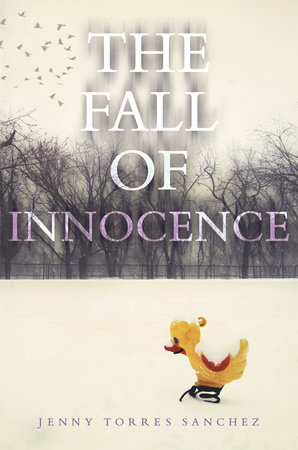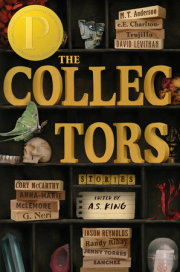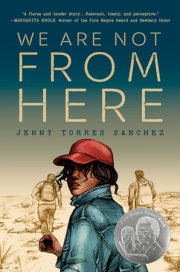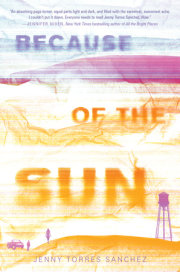Emilia searched the sidewalk for the little gifts her birds often left for her, trying not to think of how strange her mother had just acted. She came across the little gifts all the time—curiously tiny pencils, forgotten fallen beads, red-and-white twine from bakery boxes, so many extra smooth or unique pebbles, lovely leaves still intact, and so many lost mates of earrings. How many of these she’d collected in her room over the years. It was how her birds said they were thinking of her. They hadn’t forgotten that day when they watched from the treetops and saw what happened to her on the playground.
Maybe the search would lead her to
something. A strange thrill filled her as she walked and played this game.
Something, something, something. She was looking for
something. The word filled her mind. She wanted to do
something.
Something was going to happen.
Up ahead she saw the flag flying over the old elementary school.
They’re going to bulldoze it.
And suddenly she knew.
Ma doesn’t think you’re strong. Nobody thinks you’re strong. Here’s your chance to prove them wrong. Emilia looked up and noticed a single black bird flying in the direction of the school. She looked at the flag again.
She’d assured her mother that morning that she’d be fine. And she would be. She knew exactly what she was doing.
You can’t go around scared just because it’s cold, Emilia. She told herself this as she walked toward the school. Her pace slowed the closer she got, but she kept telling herself, Just go.
As she approached the building with its peaked roof and red brick, her heart beat faster and seemed to slide upward into her throat. But she made herself walk up to the doors anyway.
Don’t be afraid. You can do this. But Emilia couldn’t help it. Her eyes wandered over to the house on the corner, the spot where she’d picked up that bracelet so long ago. She still remembered so clearly when she’d looked up to see Jeremy Lance looking right back at her, trying to get her attention.
That day, Emilia had turned her head away, looked at the aide on the bus, hoping the woman would notice Jeremy Lance banging on the window like that. But she was helping other kids buckle up. So the banging got louder, and he hit the window harder with his fist.
Bam! Look. Bam! At. Bam! Me.
Bam! Look. Bam! At. Bam! Me.
That’s what Emilia heard in those thumps. But she wouldn’t look at him.
Bam! Look. Bam! At. Bam! Me.
Harder.
And harder.
Emilia should have walked away, or run to her classroom, but she felt stuck to the sidewalk. She kept her eyes on the aide, who was still buckling in children. How could it take her so long? And then she couldn’t resist. The thumping grew even louder. Slowly, she looked back at Jeremy.
He
was trying to get her attention. Emilia was sure of it.
He had looked desperate, out of control. His distorted face yelling in anger as he kept hitting the window so hard and wouldn’t stop. And then—
crack!—his hand came crashing through the sharp plastic. The broken window slashed into his arm and suddenly there was so much blood. The plastic was smeared with blood and his screams filled the air. The bus driver and the aide ran to him, but it looked like not even they knew what to do.
On and on Jeremy screamed.
And on he bled. Looking at Emilia as her brother came running back to her, how she stood there, crying.
Don’t be afraid, Tomás said, hugging her hard as she covered her ears and shut her eyes tight. But still she saw Jeremy’s face and heard his screams.
Don’t be afraid, Emilia told herself now, and let out a breath as she turned back to the two large school doors in front of her. She wrapped her hands around the ice-cold metal handles and pulled hard.
Locked. Neither door budged.
She stood there, relieved. She couldn’t get in. That was it.
You tried, she told herself.
She stepped back and looked up at the school.
Why do you even want to go inside, anyway?
Because.
Because everyone has always treated you like you couldn’t. But look, here you are. And you can’t, Emilia thought.
This sent a ripple of anger through her body. Anger she hadn’t known existed, that had come from some deep part of herself she’d forgotten and now filled her eyes with tears. She looked at the school again.
Why should she have to stand out here in the cold when she wanted to go in, take a look around, return to the place so many people thought she was too weak to return to?
I don’t need to be protected from this place. Or anything. I lived through the worst, didn’t I? She stared at the doors that refused to let her in. That shut her out. Soon this place would be gone, bulldozed, as if it never existed. And she would lose her chance.
Why did Ma take me out of school, anyway? she wondered as she pulled at the doors again. She would get in; she would find a way to get in that school now. Emilia’s determination made her forget how the past really happened, how she didn’t talk for so long afterward, how it took her so long to recover. Right now all she could think was how her sudden withdrawal had only drawn more attention to everything. And how when she was out with Ma sometimes, she’d suddenly feel someone looking at her. And each time she looked up, it was a kid her age staring at her like she was a yeti. She knew that the next day, the kids at school would be whispering about her.
Guess who I saw? Emilia DeJesus. I thought she was dead. No, no, she’s alive. But I heard she hardly ever comes out of her room, much less her house. Oh, I heard they had to put her in one of those institutions. In two years, Emilia’s absence made the kids come up with their own stories of what had happened to her. How she became a bird, a crazy bird, kept in a cage. And when Ma couldn’t homeschool her anymore because Dad left and she had to work full time, Emilia had to go to middle school, where everyone stared and stared at her for that whole first year.
She should have just come back to this stupid school right after it happened. She pictured herself walking into her old classroom that next day.
Look, I lived! she would have told them.
Emilia kicked the door in frustration.
What did you expect? That they would keep it open for you to come and face your demons? She turned and looked at the day, the unremarkable day, but one she’d sort of decided was her day of liberation. The day on which not even locked doors could keep her out.
Emilia slowly walked the perimeter of the school, looking for a way to get in without being obvious to anyone who might be watching. She noticed a broken window near some bushes along the side of the school. She looked up and down the street—when she was sure no one was around, she walked over to the window and reached in to release the latch. In moments, it was open and she slipped inside.
Copyright © 2018 by Jenny Torres Sanchez. All rights reserved. No part of this excerpt may be reproduced or reprinted without permission in writing from the publisher.






